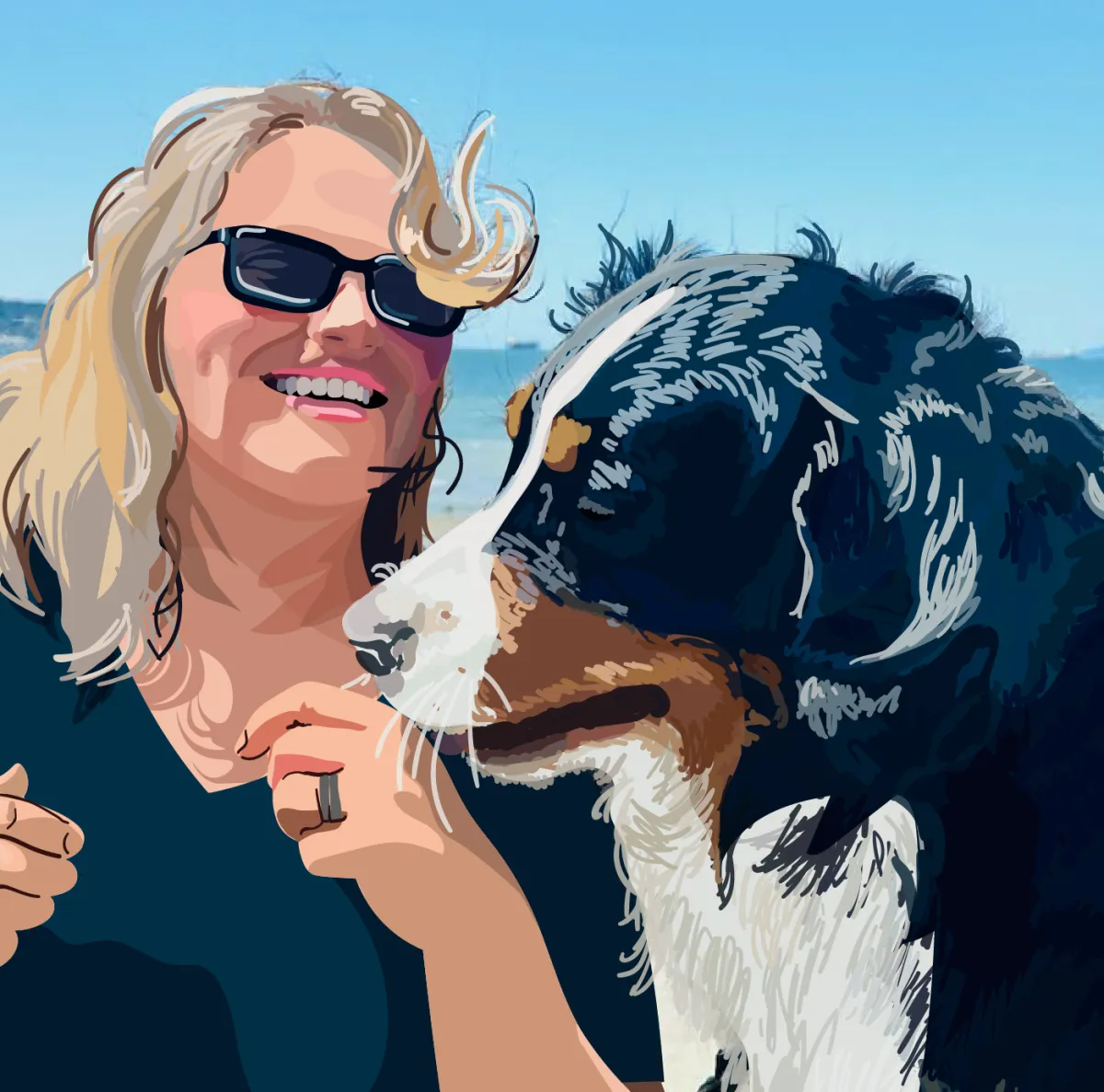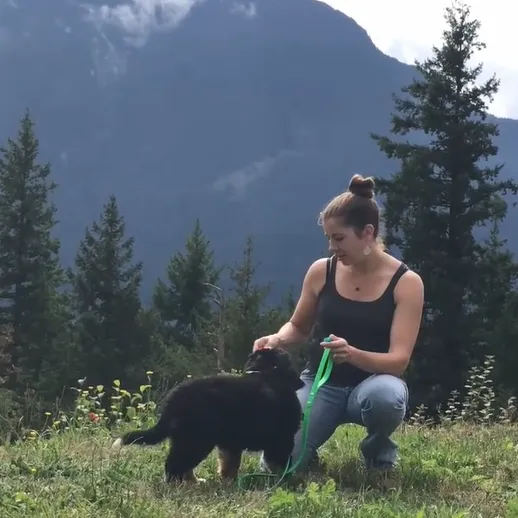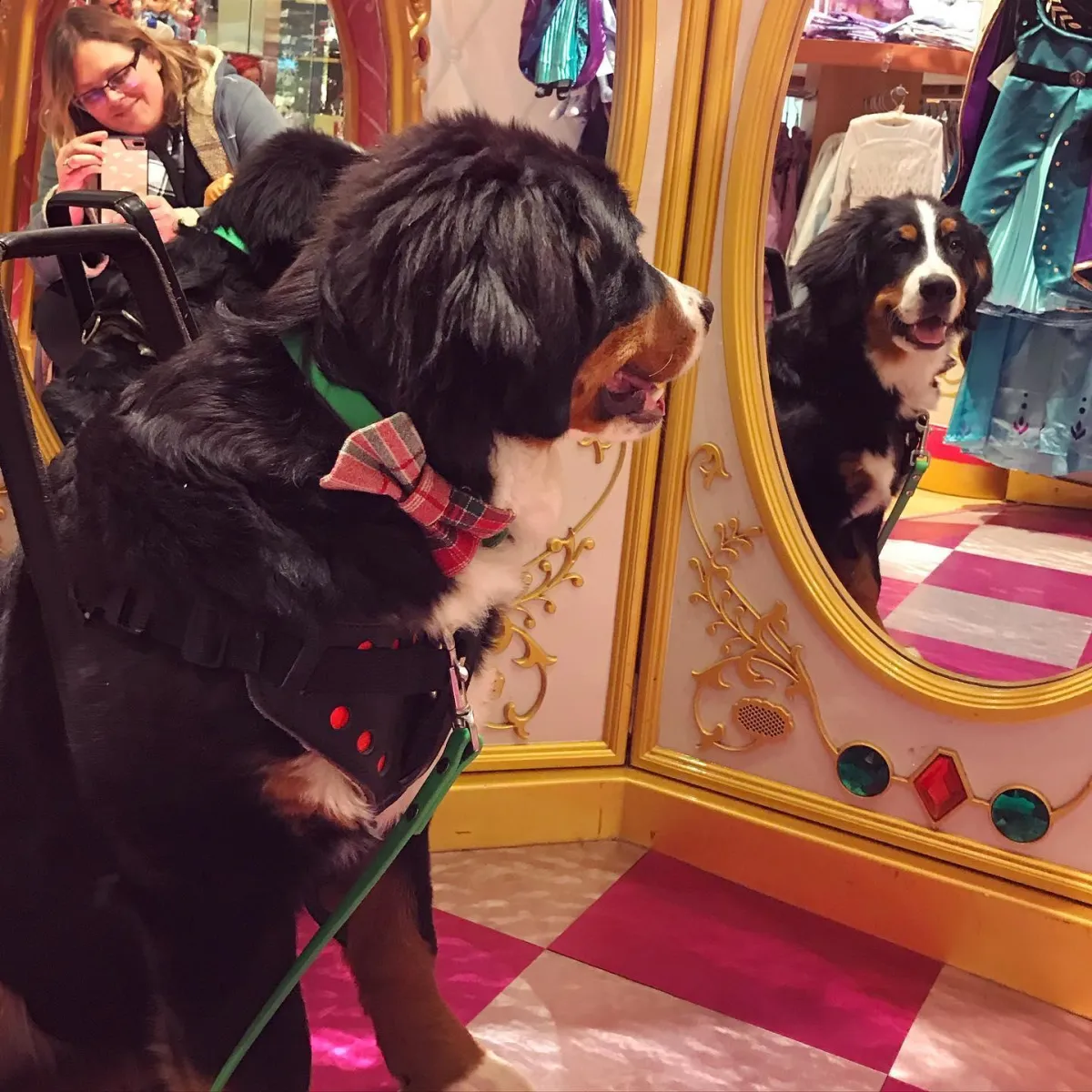

About Us
Since 2011, we’ve combined formal education in psychology, veterinary care, and canine cognition to provide exceptional dog training.
Dedicated to the humane and ethical treatment of our best friends, we rely on the latest research, while ensuring that our work is rooted in 15,000 years of human-dog connection.
Dogs and humans have evolved together for 20,000 years. They have found food for us, and protected our families and livestock. They have gone to war with us and acted as gentle playmates for our children. They have laid down their lives to save us.
Our lifestyles have changed a lot in the last century, but our need for dogs hasn't. A dog and their owner, when reunited, sync their heart rates within minutes. Just owning a dog decreases heart attack mortality by 30%.
We are designed to live with dogs, but we need to learn how to incorporate them into our chaotic modern lives.
We're here to help you and your dog learn how to live together in these modern times.
Forget sit and stay!
At Wag The Dog we can teach dogs to:
Find our phones and keys when we lose them.
Find our children when we lose them!
Put recycling in the blue bin.
Fetch their own leash for walks.
Close doors and cupboards.
Imitate our actions.
Communicate their needs and thoughts clearly.
Recognize fragile people like children and the elderly and be cautious around them.
Accompany us on outings and errands.
Trust us to return home to them when we go out.
Understand simple phrases and two step instructions.

Carol Millman (she/her)
- Lower Mainland
B.Sc, Psychology, Veterinary Technologist, Certified Pet Dog Trainer - Knowledge Assessed (2022), Certified Trick Dog Instructor
Carol lives in Port Coquitlam and works in the Lower Mainland. Her autism gives her a unique perspective which she brings to her work with both dogs and people. Her time working as a veterinary nurse culminated in becoming the Director of Medical Services at a holistic veterinary clinic.
In 2008, Carol was hired as an apprentice Advanced Instructor at Pacific Assistance Dogs Society (PADS). She trained and placed wheelchair assistance dogs, hearing dogs for the Deaf, and facility therapy dogs. She also ran puppy classes and assisted in the daily care of the dogs in training.
Carol is now the Director of Training at Heeling Assistants Canada, and still helps pet dogs through Wag The Dog.

- Currently On Leave -
Amelia Kellum (she/her) - Fraser Valley
B.Sc Canine Studies, Certified Professional Dog Trainer Knowledge/Skills Assessed (2022), Certified Trick Dog Instructor.
Amelia is a certified professional dog trainer with nearly two decades of experience training dogs - including hunting, acting, and assistance dogs such as hearing, therapy, guide, and mobility dogs.
Amelia has learned directly from Bonnie Bergin, pioneer of the disability assistance dog, and is also a graduate of the Ben Kersen and the Wonderdogs professional trainer's program.
She apprenticed at PADS as an instructor and has been training independently since 2010. She now lives in Hope with her family.
What can you achieve
with our help?
Come check out our blog!

Do as I Do, Not Do As I Cue!
The science evidence is clear - we should be teaching dogs with social learning, not with cues, reward and punishment. This is even more crucial in the case of service dogs. When will the rest of the dog training world catch up?
At Canine Assistants in Atlanta, Georgia, the dogs are born and raised on site. From the day of their birth they are cared for and enriched by the staff and volunteers of the service dog charity.
By the time they are placed with the disabled people who need them - each dog chooses their own person - the dogs can spell their own names, understand the concepts of first, second, and third, learn new behaviors simply by watching their trainer demonstrate them, and they answer yes/no questions with ease.
Despite a decades-long partnership with the Milkbone company, the dogs are never given a treat for giving a correct answer.
No, the school doesn't subscribe to old-timey long-disproven beliefs about "spoiling" dogs with treats. Quite the opposite - the volunteers and staff freely treat the dogs and share their own food with the dogs all day long.
The treats, however, are not rewards for jobs well done.
The dogs get treats and people-food regardless of how well they do at a task.
It makes sense, and it is in line with what cognitive and social psychologists have been telling us for years.
Rewards Can Be Punishing In The Long Term
Alfie Kohn's book, Punished By Rewards, came out in 1993, and is a scathing summary of decades of research which showed that any attempt to manipulate behavior using reward or punishment actually decreased the learner's enjoyment of whatever they were being rewarded FOR.
While the book absolutely demolishes what Kohn calls "pop behaviorism", his observations and the research he uses to illustrate his point is actually in line with the beliefs of Dr. B.F. Skinner, the father of modern behaviorism, and the man whose theory of "operant conditioning" is used daily by every dog trainer with a clicker and treat bag.

Skinner wrote extensively about the implication of his work on rats and pigeons - his realization that organisms learn best from their own experiences with the environment, and that the natural yen for exploration and discovery is the only teacher anyone really needs.
But all the world learned was that if you gave a rat a treat for pressing a lever, the rat would press the lever again and again.
The less convenient discoveries of behaviorism - that punishment is not effective, and that if a rat stops getting treats it will eventually stop pressing the lever - have been largely ignored.
If you want the rat to press the lever forever, Skinner kept trying to tell people, you can't use sugar water.
Unless you want to stand there forever delivering treats for lever-presses, you're hooped.
The rat has to enjoy pressing the lever because pressing the lever is FUN.
Nothing else works.
People find that inconvenient though, so the world has ignored it.
What does this mean for service dogs?
We can - and should - treat our dogs copiously when they put up with difficult, noisy, stressful situations just to keep us company.
A dog who manages to ignore a cooing passer-by and alert their handler of an oncoming seizure deserves many MANY cookies.
But the dog shouldn't be doing it FOR the cookies.
If you have to treat heavily just to coax the dog to do their job, then the dog will always do a crappy job. Service dog schools know it, and half or more prospective dogs are either sent to other schools for different types of jobs, or released to their puppy raisers as pets.
External motivation just isn't powerful enough to make a good service dog, regardless of whether you use reward or punishment to motivate them.
Reward is kinder, and has fewer side effects, but ultimately the decision belongs to the dog.
You need the dog to be motivated INSIDE - for them to genuinely enjoy the job for its own sake, rather than doing it just so they can get a reward - or avoid punishment, if the trainer is really old school about it.
Enter Social Learning
They used to say dogs can't learn from example.
When I used to train at PADS, my fellow trainers and I would often ask one dog to stay while teaching a second dog a new skill. Then we would switch.
We couldn't help believing that our dogs performed better when they had just watched another dog working on the same task. We laughed at ourselves because studies, scientists had told us, showed that dogs are not capable of imitation, unlike their wild wolf cousins.
And yet we felt so sure that the dogs did better after watching another dog. Maybe they were motivated by jealousy and more eager to focus, we speculated. Or maybe the capacity to imitate varied from dog to dog.
Pet dog trainers know how often young dogs pick up behaviors from older dogs in the household, for good or bad. So our actual lived experience made it hard to reconcile with the conclusions of scientists, who found that while wolves learn from observation, dogs do not.
Maybe not all dogs do, we thought to ourselves, but surely some dogs might have a bit of this ability left. Dogs and wolves are still technically subspecies of each other. Dog brains are a little smaller, their faces more flexible, but surely domestication didn't wipe out ALL social learning?
Little did we know that in Hungary, cognitive scientists were proving us right.
The "Do As I Do" method invented by cognitive scientists in Budapest with the collaboration of a trainer named Claudia Fugazza proved to the world that dogs are absolutely capable of imitation.
The videos are so much fun to watch!
Putting It All Together
The Do As I Do method is pretty awesome, and it lead Jennifer Arnold, executive director of Canine Assistants in Georgia, USA, to throw away the clickers.
Instead of spending twenty minutes or longer carefully "shaping" a dog to flick a light switch in return for treats, trainers at Canine Assistants just ask the dog to watch, flick the switch, and then encourage the dog to try.
"Ok," the dogs say. "Got it. What shall we do now?"
y combining canine cognitive science discoveries with the reams of evidence on learning presented by people like Alfie Kohn, Jennifer Arnold decided to do away with treats as rewards entirely.
Canine Assistants now freely treats and food-shares with their dogs but do not make treats conditional on the dog's behavior or success at learning. They're meant to send a message of unconditional love and to convince dogs that humans are wonderful, WONDERFUL beings.
She has called this the Bond-Based Approach, and she shares her information on how to do it happily and freely.
The dogs are taught from puppyhood to emulate the humans around them. They play Red Light Green Light and freeze when the human freezes. They learn to relax when the person relaxes, and touch what the trainer touches. For their efforts they get exuberant cheers of "Yay, you!", pats, and, yes, treats. But the treats come whether or not they succeeded. The treats come as a message of love and bonding.
If it sounds a little nutty to you, then that's understandable. Just about everything Canine Assistants does with their dogs goes against decades of dog trainer advice.But you can't argue with results.
"What's your success rate, if you don't mind me asking?" I asked Ms. Arnold when she graciously took the time to talk to me on the phone.
"Oh," she said, as if taken aback. "Well... it's not as if we never put dogs out to be pets... we had one last year that... well actually, we have one right now that... I mean it definitely happens, but... I'd say we're in the high nineties."
HIGH NINETIES?
OVER NINTEY PERCENT SUCCESS RATE??
Canine Assistants places between 75 and 100 dogs a year with people whose disabilities range from diabetes to quadriplegia to PTSD. They're one of the few service dog schools who will place dogs with small children, which most schools shy away from.
They do it without teaching the words "sit", "heel" or "lie down".
They don't believe in teaching "cues". They believe in teaching vocabulary and letting dogs make their own decisions, particularly as relates to their body position.
They do it with flat collars and a double-handled leash that the dog holds in their mouth as they walk, so that the dog and the person walk each other.
They do it by freely feeding the dog pieces of whatever they are eating.
They do it by cheering "yay you!" when a dog tries to copy a human action.
They do it by asking the dog, "do you want a bath?" and saying "ok" if the dog says "no".
They do it while prioritizing above ALL else the feelings and choices of the dog.
And their success rate is higher than most service dog schools even dream of. Sixty to eighty percent is considered highly successful in the service dog world, where dogs are specially bred and raised to maximize all chances of success.
I don't even know what to say about being so close to 100% that dogs who wash out are considered unusual exceptions.
In her book, Love Is All You Need, Jennifer Arnold states again and again that unconditional love is not the same as being overly permissive. The leadership they provide is not authoritarian, nor permissive - it is authoritative: Nurturing, responsive, but with firm limits.
It works on kids, and apparently, it works on dogs, too.
This is the future of dog training
While Canine Assistants is at the forefront of using social learning and attachment theory to teach their dogs, many service dog schools are moving in that direction. Guide Dog schools now commonly use freedom of choice, enrichment, and bonding as part of their curriculum.
They don't do it because it's ethical or humane - although of course that is a factor - they do it because it increases their success rates.
Service dog schools have good reasons to promote interdependence between human and dog, but I believe this will eventually leech into the pet dog world as well.
Give it twenty years, and all trainers will be teaching dogs by modelling behaviors and expecting the dogs to copy them.
Just you wait.

We work on land which was taken from the nations who had lived here for thousands of years. They are still here and they are still waiting patiently for us to stop being jerks about it.
© 2024 Copyright Wag The Dog Training
All Rights Reserved




